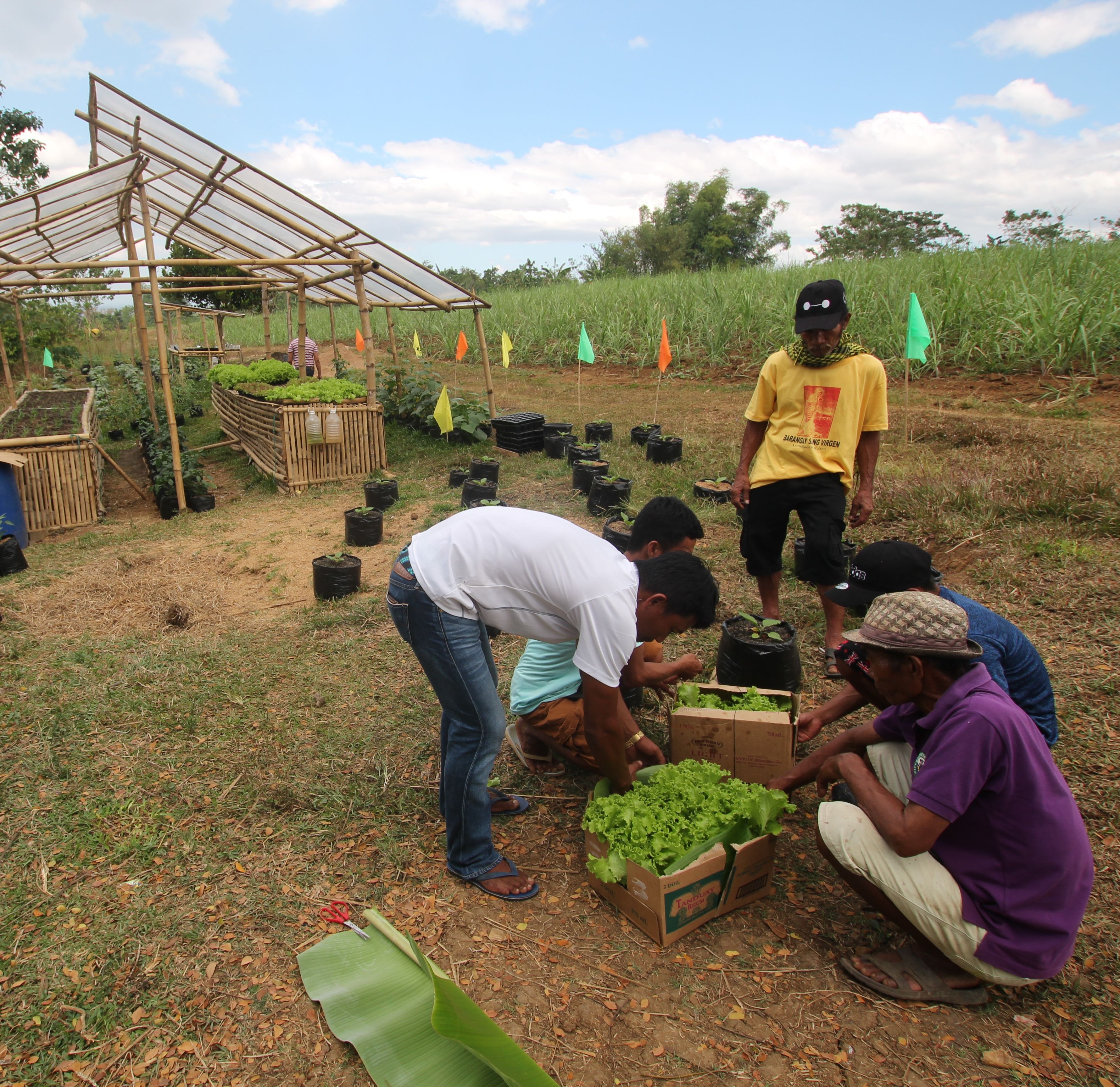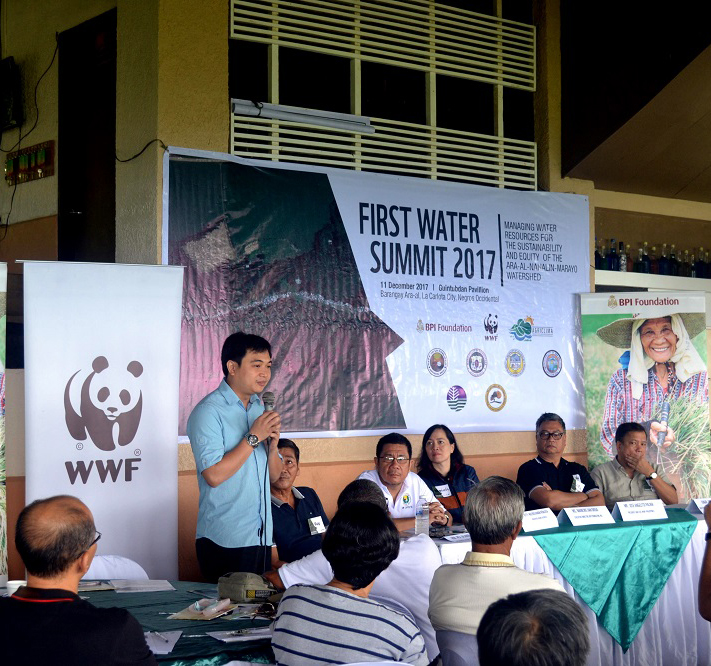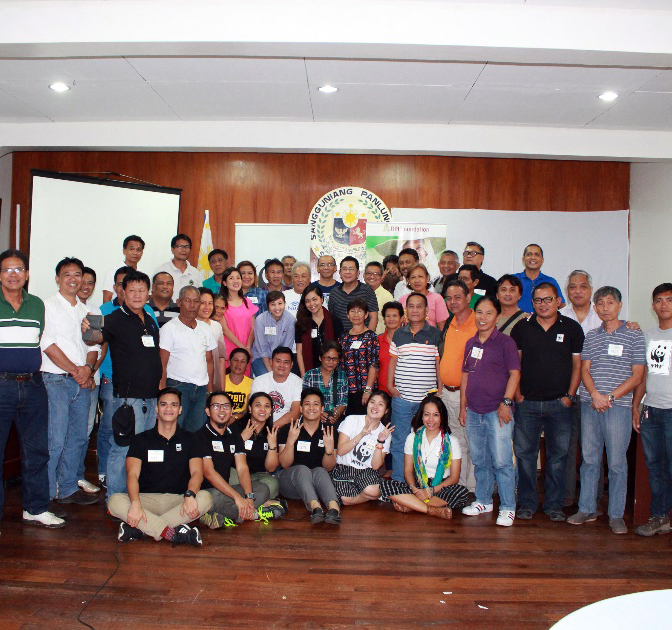The partnership project on Climate-Proofing Agricultural Landscapes (AgriClima) of BPI Foundation, Inc. and WWF-Philippines implements a landscape approach to managing the natural capital of the sugarcane ecosystems in Negros Occidental. In particular, the project aims to ensure the sustainability of the Ara-al-Nahalin-Marayo Watershed which spans the city of La Carlota and the towns of Valladolid, San Enrique and Pontevedra in Negros Occidental through a multi-stakeholder Integrated Water Resources Management (IWRM) planning strategy.
The collaborative and multi-stakeholder approach recognizes that the major causes of problems relating to water resources management may not be site-specific and that action plans require the active participation of all the stakeholders (government and private sector) within the landscape.
At the farm level, the project aims to mainstream the adoption of climate-smart agriculture approaches to deepen the understanding of smallholder sugarcane farmers and stakeholders on climate-related risks in agriculture as well as provide venue to integrate weather and climate information with agricultural and business planning processes.
Major Project Components
1. Development of an Integrated Water Resources Management Plan for the Ara-al-Nahalin-Marayo Watershed
The conduct of the localized planning works per LGU is aimed at creating an enabling environment for the local multi-stakeholder group to collaborate and work together to craft an effective integrated water resources management (IWRM) strategy for the Ara-al-Nahalin-Marayo Watershed which covers a total of 22,000 hectares with more than 16,000 hectares devoted to sugarcane production.
Anchored on shared value principles, the workshop hopes to address relevant issues and concerns that impact the sustainability of the water resources as a critical natural capital for the development of La Carlota City, Valladolid, San Enrique and Pontevedra. In particular, the planning process aims to:
- Provide common understanding on the concepts, principles and models of watershed management;
- Present the results of the resource assessment (hydrology, hydrogeology and soil and land use assessment) conducted, and;
- Identify gaps, challenges and potential opportunities in the sustainable management of the watershed.
2. Social Preparation Intervention and Adoption of Climate Smart Agriculture Approaches in Sugarcane Production for Smallholder Sugarcane Farmers
The social preparation intervention focused on establishing and improving the profitability of block sugar farms as agribusiness enterprise units of the smallholder farmers’ organization. The implementation of the block sugar farming has provided smallholder sugarcane farmers opportunity to diversify sources of incomes, maximize yields and economies of scale. Through block farming, what used to be fragmented lands due to agrarian reform has now become a collective agribusiness enterprise unit and a model for smallholder sugarcane farmers.
The block sugar farms can take advantage of plantation-scale production, cost-efficiency in farming practices and a more focused business development and agricultural extension interventions. The business development services and agriculture extension interventions focused on these major activities:
- Baseline socio-economic studies were conducted to measure the socio-economic well-being of the organizations and their farmer members.
- Capacity development on integrated nutrient management and its integration in the sugarcane production protocols of the smallholder farmer-participants;
- Technology transfer on proper soil testing and analysis;
- Capacity development on farm financial transaction planning, formulation of farm operations manual and business plan preparation for the access to the external financing for sugar block farms.
3. Project Impact
The social preparation interventions has provided capacity development to a total 2,637 smallholder farmers representing 13,185 household members. The 15 agrarian reform organizations has over 450 hectares of sugarcane block farms organized and prepared for sustainable sugarcane production protocol as well as P45 million potential financing opportunities for the block farms.
LATEST STORIES
New Study Provides Suggestions for Climate-Proofing Sugarcane Farmers
A recent study from the World Wide Fund for Nature (WWF) Philippines has recommended
WWF-Philippines, BPI, SRA Inaugurate Food House
The 6th of March, 2019, saw the inauguration of the first eight food houses to be constructed under the Climate-Proofing Agricultural Landscapes
The AgriClima LGU Workshop Series
La Carlota City, Negros Occidental served as the workshop series’ pilot




